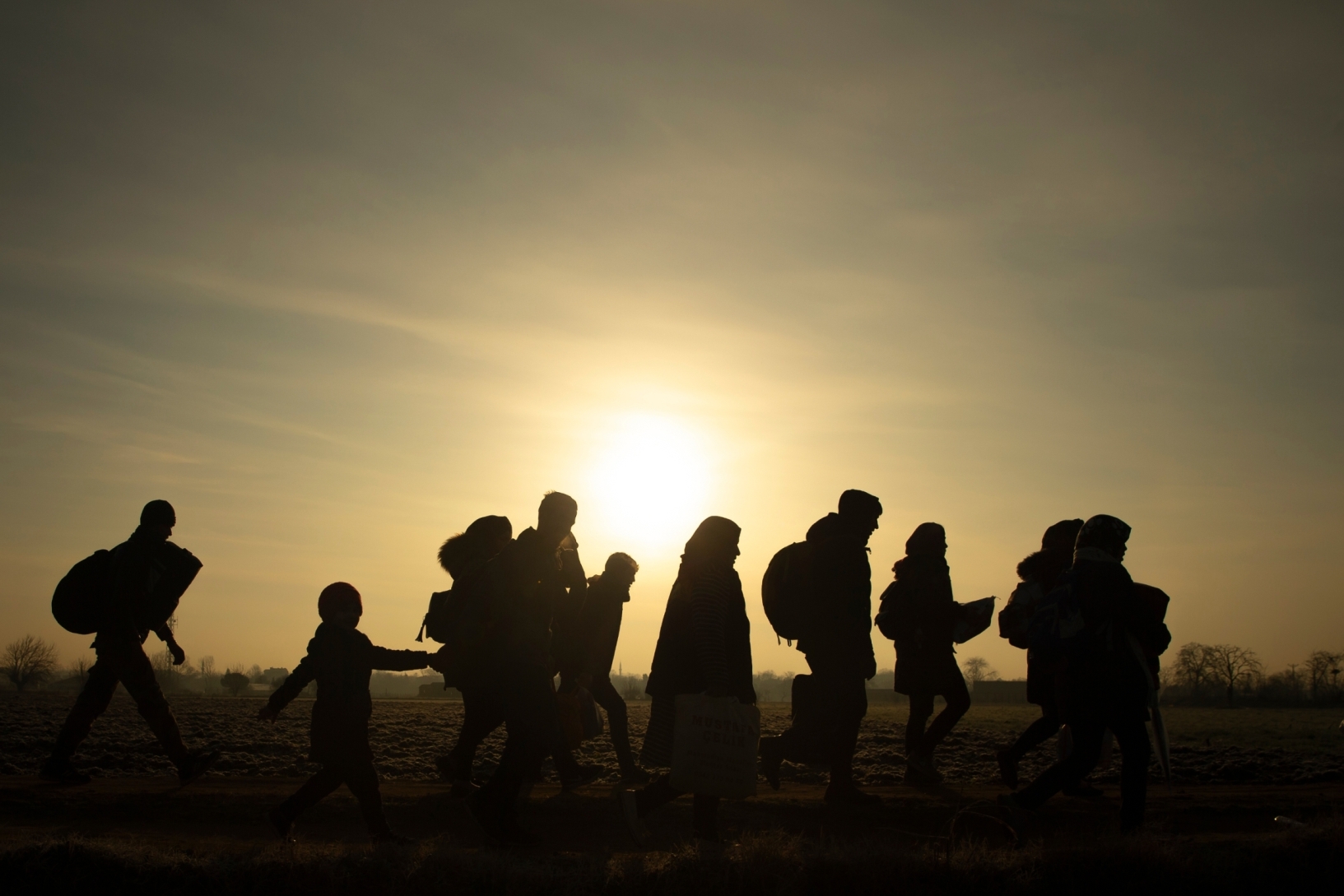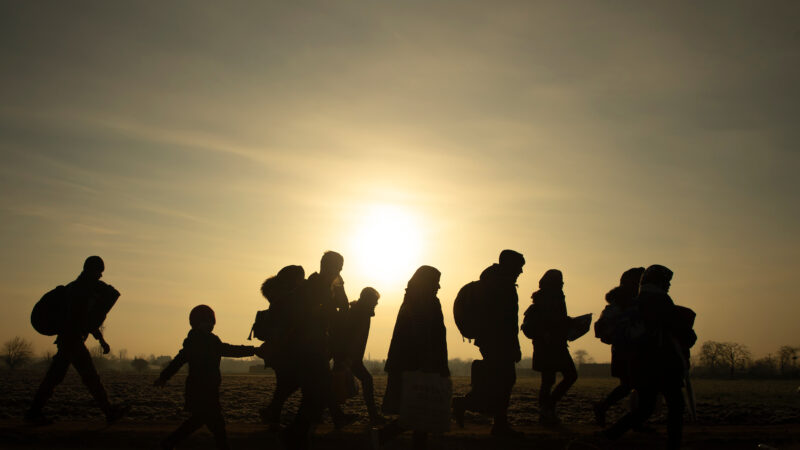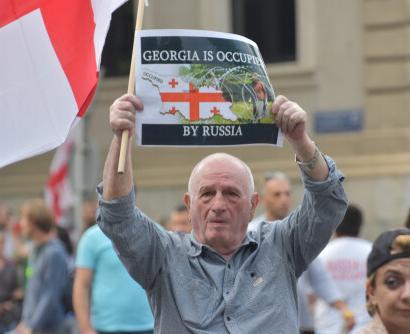Abstract: The mass-fleeing of people from Ukraine and several other recent incidents suggests that not every migrant or refugee was treated with the same dignity. There are stark differences in the approach of immigration officials and border security forces towards People of Color (POCs) when compared to their Caucasian or white counterparts. These incidents demand that the discussion around the implications of race in contemporary ‘securitization of migration’ be revisited. There is a need to understand how race made its way into the migration security concept and critically view how the real causes behind the migration patterns are overshadowed by the pictures painted by news channels and politicians. These sentiments fall in line with the implications of terrorist attacks, rising islamophobia, and ways forward in envisioning harmony, despite cultural nuances.
Problem statement: How relevant is race in contemporary ‘migration security’?
Bottom-line-up-front: Race implicitly continues to be a decisive factor in who should enter and exit a given nation. The politics of fear and othering of migrants of color has created several ramifications that are apparent in today’s immigration policies. The current migration ecosystem stands to benefit from greater attention and research on the impacts of this ‘New racism’ and how we, as a society, can counter it.
So what?: Ongoing policies like the EU’s ‘Anti-Racism Action Plan’ proactively exist, but simultaneously, other policies that clash with the goals of the former persist. There is a need for improved attention to the usage of racially blind/charged language by reporters in the media, and nations could come together to create more legal channels of migration for POC. Further, it is necessary to study the causes of migration and create a culture of tolerance and acceptance towards everyone. For example, this could mean creating an inclusive language guide for media, supporting R&D for better migration data, and tracking and investing in migrant integration.

Source: shutterstock.com/Lumiereist
Differential Treatment of Migrants
The recent Russia-Ukraine conflict has resulted in the mass displacement of Ukrainian people to other parts of Europe. When Europe opened its doors to refugees from Ukraine, POCs faced stark differences in how the border forces treated them. On multiple accounts, several African, middle eastern, and Asian students reported how security officers assaulted and halted them from boarding buses. At the same time, European policymakers made radical shifts in their anti-immigration stances to welcome the “white” refugees from Ukraine as they, claimed by many reporters, are “civilized” like “any European family.”[1] For example, the United Kingdom’s ‘Nationality and borders’ bill (often dubbed as anti-refugee) which according to Oxfam, “rips up internationally recognized rights for people fleeing war and persecution and will criminalize thousands of refugees.”[2] On the other hand, Ukrainian nationals were welcomed by the ‘Homes for Ukraine’ Scheme, despite Ukraine was not the only country that experienced a conflict during that time. For example, South Sudan was doubly affected by an armed conflict, a massive flood, and their ongoing war in Syria, creating thousands of refugees every day. This racially biased treatment is not limited to refugees who arrive in rickety boats and other illegal means. It is also comprised of suspicious looks that persons of color receive from immigration officers at facilities like airports. These issues point to a need for a rekindling of the racial discourse around the ‘securitization of migration.’
On multiple accounts, several African, middle eastern, and Asian students reported how security officers assaulted and halted them from boarding buses.
Migration As a Security Concern
Migration was not always related to a security concern. It was particularly after the 9/11 World Trade Centre attack in the USA when ‘migration as a threat’ was no longer limited to academic circles. Post 9/11, most western states’ security infrastructure went beyond military strength to intense surveillance of immigrants that went beyond document checks to racial and religious profiling. The discourse around the ‘securitization of migration’ soon emerged as “a political technique of framing policy questions in logics of survival with a capacity to mobilize politics of fear in which social relations are structured based on distrust.”[3] In no time, blaming migrants infamously turned to a governance strategy to enhance political legitimacy and improve public support.[4] Moreover, restrictive European policies leave little room for safe and legal migration channels. It is to be noted that said focus on perceiving migration as a threat has resulted in a blind eye turned towards pressing issues like global inequality, conflict displacement, and climate change. The latter issues have escalated to the extent that several western nations are considered saviors through their accommodation of refugees; at the expense of their national security. Such a mindset based on racial differences, and non-adaptive thinking gives way to adopting dehumanizing practices like imprisonment and police brutality while dealing with refugees.[5]
In no time, blaming migrants infamously turned to a governance strategy to enhance political legitimacy and improve public support.
According to Development Studies scholar Maggie Ibrahim, the understanding of the securitization of migration is nothing less than racism in its most modern form. She elaborates, adding: “The principle, or position, which links immigrants and the demise of the nation, is that cultural differences threaten the existing way of life. It is thus seen as rational to preserve one’s culture through the exclusion of the other cultural group. This negative attitude toward migrants should be understood as racism.”[6] The term “New racism” was coined by Barker in 1981, who spearheaded the concept of “cultural racism” in the context of rising right-wing support in the UK.[7] Turkish Scholar Togral claims this “new racism” to be hidden and shadowed by notions for preserving one’s identity and culture, here the ‘European Culture‘.[8] This segment of society that was always labelled as the ‘other’ would be the same one treated as an enemy. Adding on, the suitable enemy ideally would be an immortal one that could be attacked continuously but would never be defeated and should be potent enough to take forward the fight for many more years.[9] Immigrants meet all the above-mentioned criteria satisfactorily. Immigrants are seen as threats to western culture that arrive to receive help from first-world economies. The same sentiments could also be used in understanding successive electoral polls. In this light, Huysmans finds that many policies drafted by the European Union indirectly support the thought of “cultural homogeneity as a stabilizing factor”.[10] However, it is to be noted that this new form of racism is not a substitute for earlier forms which were primarily based on physical attributes. It only adds a cultural dimension.[11]
This limited migration as an issue in relation to national order, painting images of foreigners taking up native jobs, tampering the cultural homogeneity, and deviating from asking questions like why the movement happened in the first place. A deep dive into analyzing the factors behind major mass migrations stands an inexplicable link to colonialism and the economic inequality it created, the Cold War, colonizer greed, and the need to control natural minerals and other resources, particularly in Africa and the Middle East. To elaborate, there are studies proving that military interventions, especially in Afghanistan and Syria, among many others, had spiked the number of migrants from these regions. In addition, for many centuries, European empires profited out of colonising countries in Asia, Africa, and the Middle East. This deeply impacted the political, social, and economic stability of the nations, leading to conflicts and military rule among others.[12] Rather than ”catering” to mainstream discussion, ‘the politics of fear’ along with an image of western nations saving many lives.[13], [14]
A deep dive into analyzing the factors behind major mass migrations stands an inexplicable link to colonialism and the economic inequality it created, the Cold War, colonizer greed, and the need to control natural minerals and other resources, particularly in Africa and the Middle East.
The racial implications of securitization of migration cannot be understood effectively without analyzing the ‘politics of fear’, which can poison any logical debate. For many, International Relations as a discipline often dismisses the role that “passions and emotions” play in framing governance and electoral strategies.[15] Several such populist politicians very well know the fact that igniting a “fear of the unknown” would serve them well as the masses would prioritize their differences rather than unification for civic needs. “Western societies are witnessing the emergence of many existential and conceptual anxieties and fears about their identity, security, and well-being […] By its transnational character, its dynamic, and its impact on people and institutions at all levels, migration is perceived to pose a serious challenge to the long-standing paradigms of certainty and order”.[16] Likewise, the differences in one’s appearance tend to catapult fear when combined with images of tattered and scruffy-looking migrants shared by western media, creating a new enemy to the state. This bluntly coincides with Samuel P. Huntington’s famous “clash of civilizations” concept, which suggests that cultural and religious differences would single-handedly contribute to much of the conflict post-cold war. As migration is pictured as a threat to the host nation’s identity, it quickly becomes a national threat. In the end, all these mechanisms contribute to dangerous and irrational generalizations and a failure to view migrants as individuals beyond a collective label.[17]
The Way Forward
Europe and the USA have not completely overlooked migration’s racist practices.[18] Following the murder of George Floyd in the USA and the massive worldwide protests it ignited, the EU presented its first ever ‘Anti-racism Action Plan,’ to “develop a racism-free EU reality”.[19] Even though the plan seems overly ambitious, it could be considered an acceptable position to start with. However, following the many terrorist attacks, including the recent ones in France and Austria, many governments have created policies that target migrants, some Muslim ones in particular.[20] One fine example of the same is ‘The Patriot Act’ in the USA; recently, its dark implications were vividly described by famous political talk-show host Hasan Minhaj on his Netflix show titled the same.[21] A recent addition is the ‘Pact on Migration and Asylum’, which primarily aims to prevent irregular migration. Within the pact, first, the migrants must be distinguished based on their country of origin, and the asylum system excludes several claims where people need protection. For example, climate migration, which is truly relevant today, is not recognized by the United Nations High Commission on refugees. Since we cannot sectionalize migration and racism, there are several ways to live up to the anti-racism commitments. For starters, acknowledging past mistakes of racially negligent policies and differential treatment towards immigrants of color is necessary to envision a better future. Race-blind policies would only foster greater racist sentiments. Similarly, countries can enter partnerships to ease more legal migration channels. On a broader scale, the media should be urged to use the racially right language to combat painting the wrong images in people’s minds and building unnecessary anxiety. With calculated efforts, we can do better than now to cherish ‘Equality in Diversity.’
One fine example of the same is ‘The Patriot Act’ in the USA; recently, its dark implications were vividly described by famous political talk-show host Hasan Minhaj on his Netflix show titled the same.
Varsha Varghese is an International Studies scholar at SOAS University of London. She currently works with SCRAP Weapons, a London-based think tank that works towards complete disarmament. Her research interests include Migration Diplomacy, Security Studies, Race, and Identity. The views contained in this article are the author’s alone.
[1] Philip Howard, Bryan Johnson and Kevin Sen, “Ukraine refugee crisis exposes racism and contradictions in the definition of human,” The Conversation, March 21, 2022, https://theconversation.com/ukraine-refugee-crisis-exposes-racism-and-contradictions-in-the-definition-of-human-179150.
[2] Scott Challinor, “Disputed Bills Pass Parliament before Prorogation Deadline | the Leaders Council of Great Britain & Northern Ireland,” www.leaderscouncil.co.uk, April 29, 2022, https://www.leaderscouncil.co.uk/news/disputed-bills-pass-parliament-before-prorogation-deadline.
[3] Jef Huysmans, “The European Union and the Securitization of Migration,” JCMS: Journal of Common Market Studies 38, no. 5 (December 2000): 751–777, https://doi.org/10.1111/1468-5965.00263.
[4] Rachel Shabi, “How Immigration Became Britain’s Most Toxic Political Issue,” The Guardian (The Guardian, November 15, 2019), https://www.theguardian.com/politics/2019/nov/15/how-immigration-became-britains-most-toxic-political-issue;Michael Humphrey, “Migration, Security and Insecurity,” Journal of Intercultural Studies 34, no. 2 (April 2013): 178–195, https://doi.org/10.1080/07256868.2013.781982.
[5] Chris Waugh, “Global Migration: The Global North’s a Saviour?,” Global Social Challenges, June 30, 2022, https://sites.manchester.ac.uk/global-social-challenges/2022/06/30/global-migration-the-global-norths-a-saviour/.
[6] Maggie Ibrahim, “The Securitization of Migration: A Racial Discourse1,” International Migration 43, no. 5 (December 2005): 163–187, https://doi.org/10.1111/j.1468-2435.2005.00345.x.
[7] Paul Gilroy, Book Reviews : The New Racism by MARTIN BARKER (London, Junction Books, 1981). 181pp. £4.95,” Race & Class 24, no. 1 (July 1982): 95–96, https://doi.org/10.1177/030639688202400114.
[8] Burcu Togral, “Convergence of Securitization of Migration and ‘New Racism’ in Europe: Rise of Culturalism and Disappearance of Politics,” in Security, Insecurity and Migration in Europe (London: Routledge, 2016), 219–237.
[9] Nils Christie, “The Ideal Victim,” From Crime Policy to Victim Policy 1, no. 1 (1986): 17–30, https://doi.org/10.1007/978-1-349-08305-3_2.
[10] Ibid, iii.
[11] Ibid, viii.
[12] Alexander Orekshaville, “Colonialism and International Law Made Refugees Inevitable – Britain Can’t Ignore Its Responsibilities Now – Birmingham Law School Research Blog,” blog.bham.ac.uk, 2021, https://blog.bham.ac.uk/lawresearch/2021/12/colonialism-and-international-law-made-refugees-inevitable-britain-cant-ignore-its-responsibilities-now/.
[13] Idem.
[14] Gurminder K. Bhambra, “The Current Crisis of Europe: Refugees, Colonialism, and the Limits of Cosmopolitanism,” European Law Journal 23, no. 5 (September 2017): 395–405.
[15] Neta C. Crawford, “Institutionalizing Passion in World Politics: Fear and Empathy,” International Theory 6, no. 3 (October 9, 2014): 535–557, https://doi.org/10.1017/s1752971914000256.
[16] Ayse Ceyhan and Anastassia Tsoukala, “The Securitization of Migration in Western Societies: Ambivalent Discourses and Policies,” Alternatives: Global, Local, Political 27, no. 1 (February 2002): 21–39, https://doi.org/10.1177/03043754020270s103.
[17] Samuel P. Huntington, “The Clash of Civilizations?,” Foreign Affairs 72, no. 3 (1993): 22–49.
[18] Abigail Cardenas, “Migration and Anti-Racism Policies: Is Europe Racism-Free?” PICUM, March 18, 2021, https://picum.org/migration-anti-racism-policies-are-we-ready-for-racism-free-europe/.
[19] Abigail Cardenas, “Migration and Anti-Racism Policies: Is Europe Racism-Free? • PICUM,” PICUM, March 18, 2021, https://picum.org/migration-anti-racism-policies-are-we-ready-for-racism-free-europe/.
[20] David Andreas Bell, Marko Valenta, and Zan Strabac, “A Comparative Analysis of Changes in Anti-Immigrant and Anti-Muslim Attitudes in Europe: 1990–2017,” Comparative Migration Studies 9, no. 1 (November 23, 2021), https://doi.org/10.1186/s40878-021-00266-w.
[21] Richard A Preus, Patriot Act with Hasan Minhaj (October 28, 2018, New York, Art and Industry and Haven Entertainment), Netflix.






